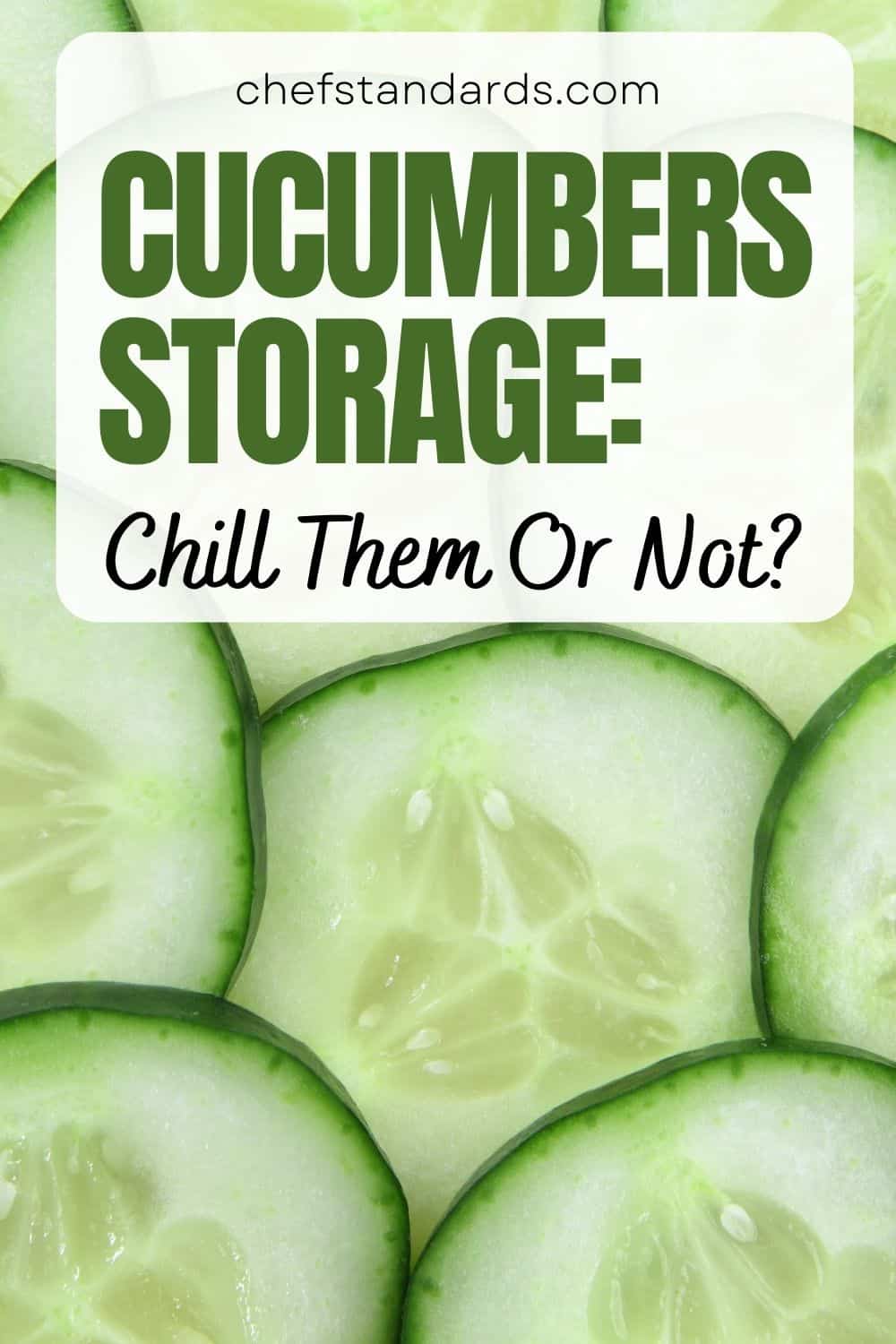I thought that I knew everything about cucumbers, including how to store them the right way. I was always putting them in the fridge, thinking this is the best way to maintain their freshness.
But, do cucumbers need to be refrigerated? To my big surprise, I found out that there is no need to store cucumbers in the fridge and that they are actually better at room temperature, especially if whole.
But why is that so and how to properly store cucumbers so that they can stay fresh and crispy?
Why Isn’t It Essential To Refrigerate Cucumbers?
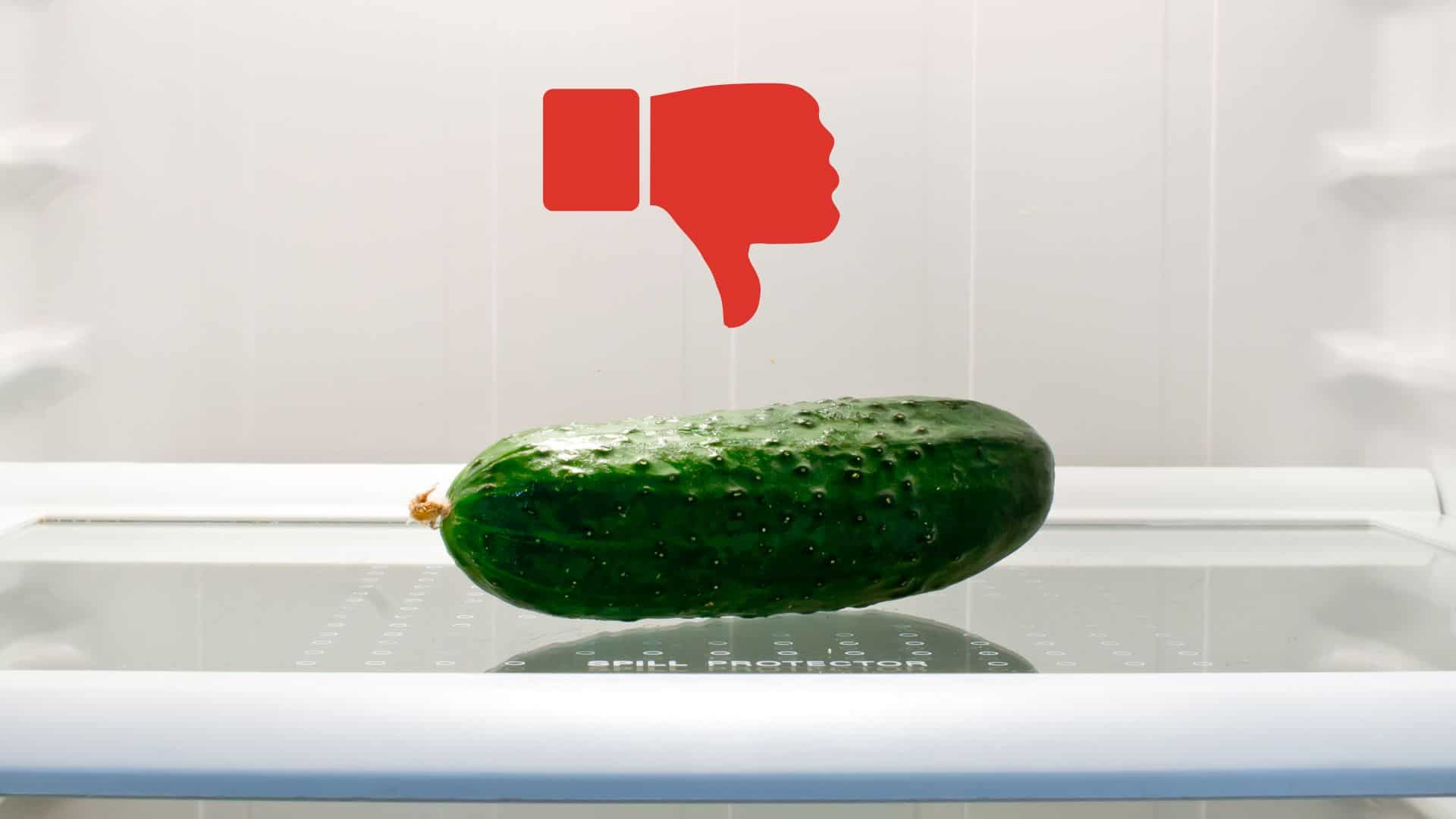
Now that you know that storing cucumbers in the refrigerator is not the best storage method, many questions arise.
However, when you think about it a little, some answers can come naturally. Namely, cucumbers have exceptionally high water content and the temperature in the fridge is quite low.
Because of that high water content, cucumbers tend to be highly sensitive to low temperatures, as they are prone to pitting, wateriness, and quicker decay (so-called “chilling injuries”) than those kept at milder temperatures.
But what is the exact temperature limit for cucumbers?
Well, cucumbers won’t thrive at temperatures that are lower than 50 degrees Fahrenheit, and we all know that the standard fridge temperature ranges from 33–40°F.
However, all this doesn’t mean that you can not put them in the fridge for some time. Don’t worry, you can. But, they won’t last as long as when you store them at room temperature.
How Long Will Cucumbers Last If You Refrigerate Them Eventually?
If you are a fan of chilled cucumbers, you can eventually refrigerate them for some time, but that time should be brief.
According to the United States Department of Agriculture (USDA), cucumbers can be stored in the fridge for up to 1 week. (1) The same applies to cherry tomatoes.
However, from my own experience, cucumbers start to deteriorate at fridge temperature after only 5 days in the fridge.
So, my advice is to avoid storing cucumbers in the fridge if you are planning to leave them there for more than 5 days, and, ideally, you should store them in the fridge for about 3 days if you want to find them there as fresh as they were before storage.
Refrigerate Whole Cucumbers The Right Way
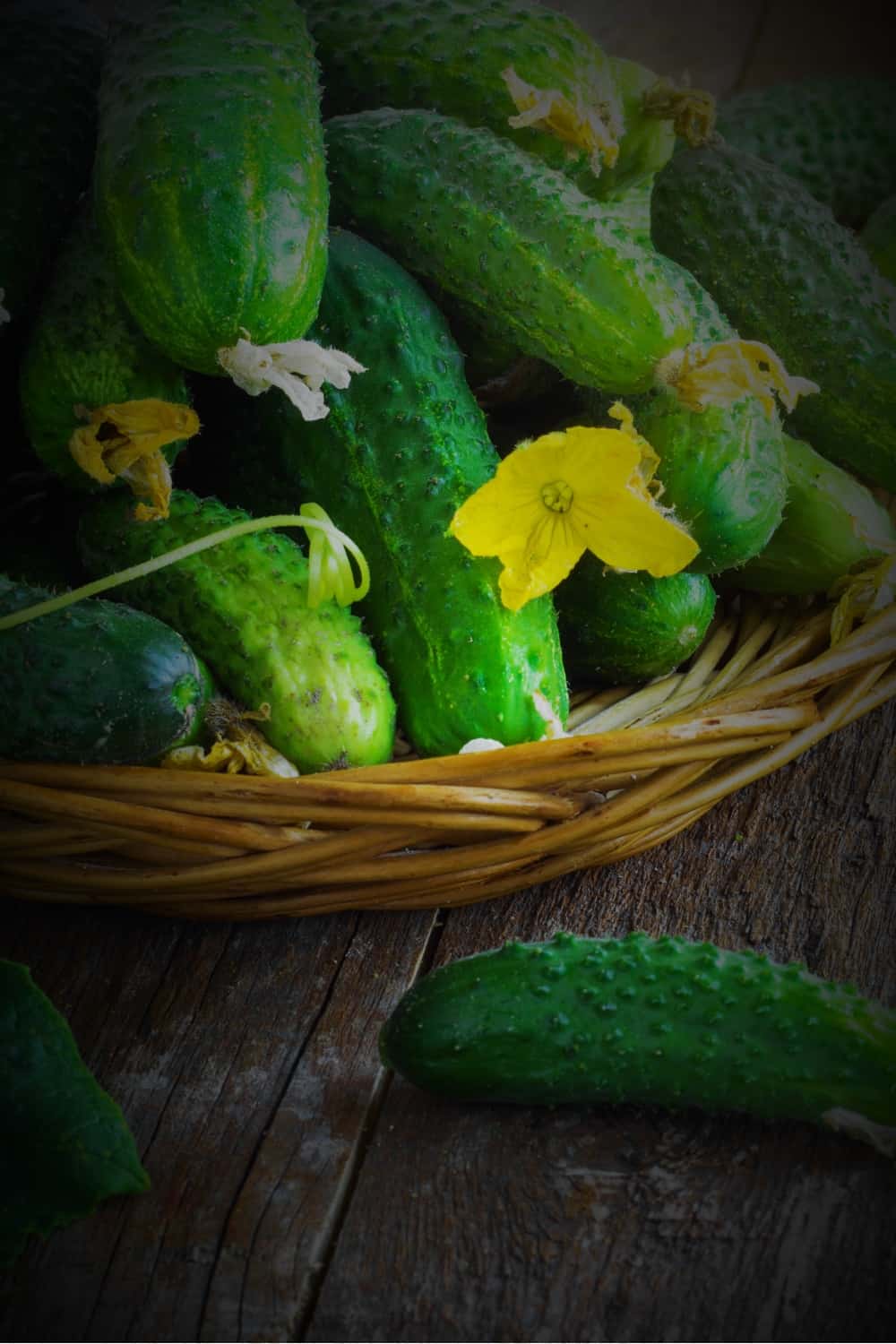
As you can conclude from the previous paragraphs, although the fridge is not their ideal place to be, cucumbers can be refrigerated for a shorter period of time.
However, you must know how to do that properly or you will ruin them and won’t be able to enjoy their freshness and crispiness. So, here are some tips you need to follow in order to do that the right way.
• Choose Fresh Cucumbers: No matter how you store them, everything will be in vain if you choose cucumbers that are soft, mushy, or have signs of mold or rot.
So choose fresh and firm cucumbers because they will be able to maintain their freshness for longer if stored in the fridge.
• Do Not Wash Them: This doesn’t mean that you shouldn’t wash them at all, but it is not recommendable to wash them before refrigerating.
Cucumbers do not like wetness because, on their surface, excess moisture can be created, and that can create a damp environment that is ideal for bacterial growth.
So, wash your cucumbers only before you decide to consume them.
• Wrap Them Properly: Make sure to wrap each cucumber individually in paper towels or a clean kitchen towel.
By doing this, you will protect your cucumbers from any external moisture and prevent them from touching each other, which can cause bruising and spoilage.
• Place Your Cucumbers In A Plastic Bag: After you wrap them the right way, it is also essential to put the wrapped cucumbers in the plastic bag and seal the bag properly.
This will help your cucumbers to maintain the right level of humidity and prevent them from drying out.
• Put Them In The “Warmer Part” Of The Fridge: Do not put cucumbers in the crisper drawer because that is the coldest part of the fridge. Instead of that, it is best to keep them toward the front of the shelf and off the bottom shelf.
Also, keep your cucumbers away from the cooling elements (like the evaporator) and from fridge walls that also tend to be very cold.
• Intermittent Warming: Intermittent warming to non-chilling temperatures for 12 h every 2 or 3 days can reduce chilling injury of cucumbers held at 32 to 36 °F (0 to 2 °C).
Aside from that, you can avoid the development of chilling injury symptoms if you use chilled cucumbers immediately after removal from storage. (2)
What Is The Best Way To Store Them?
The other two ways to store cucumbers are to freeze them or leave them at room temperature. Since low temperatures are not a cucumber thing, the freezing method is not in the game, so storing them at room temperature is the only other option.
However, this method is only the best method if you go through the storing process the right way. Fortunately, it isn’t anything difficult, but you have to know some tips and tricks in order for it to work.
• Keep Them Dry: Just like when storing cucumbers in the fridge, you should protect them from any excess moisture that can promote the growth of bacteria and mold.
So, you shouldn’t wash them unless you are planning to use them right away.
• Cool Environment: It is true that cucumbers do not like very low temperatures, but high temperatures are not their thing either.
So, according to the information from Cornell University, recommended conditions for storage of cucumbers are 50 to 54 °F (10 to 12.5 ºC) at 95% RH. (2)
Everything below 50 degrees F will result in chilling injury, while storage at 59 degrees F or above results in rapid yellowing and loss of quality.
• Avoid Direct Sunlight And Heat Sources: It is essential to keep your cucumbers away from direct sunlight and heat sources (like the oven for example) because they can damage the fruit.
Namely, when you expose cucumbers to direct sunlight and heat, the heat causes the cucumbers to lose their crispness, become wilted, and develop soft spots.
Aside from that, sunlight can increase the production of cucurbitacin, a chemical compound that is produced when cucumbers are exposed to stress.
Those chemicals can make your cucumbers develop an unpleasant bitter taste and can even make them potentially harmful if consumed in larger amounts.
• Be Aware Of Ethylene Gas: When you decide to store your cucumbers at room temperature (in the right conditions), it is essential to store them away from fruits and veggies that produce ethylene gas (avocados, bananas, apples, melons, etc.).
Namely, ethylene gas triggers the production of enzymes in cucumbers that cause them to break down and age more quickly. They may develop brown patches, become soft, and lose their freshness and flavor.
How Long Do Cucumbers Last At Room Temperature?
You now know all the important tips and tricks for storing whole cucumbers at room temperature the right way. But how long will they stay good in those conditions?
Well, if you store them according to the rules explained above, your whole cucumbers will stay good for about 2 weeks at room temperature.
As you can see, that is twice as long as if you were to store them in the fridge. So, it is definitely worth it if you want to preserve them for longer.
Do You Have To Refrigerate Cut Cucumbers?
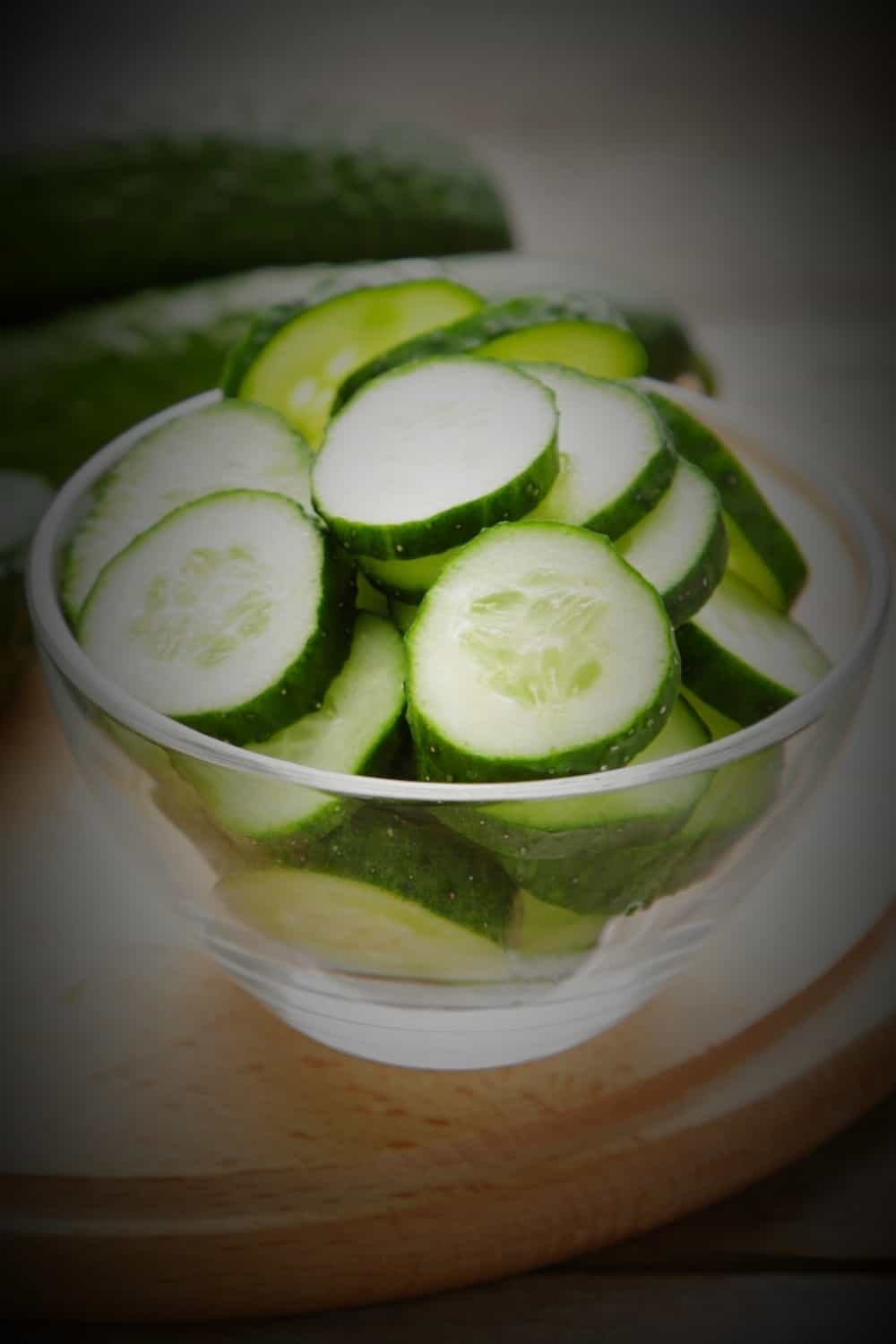
Once you cut your cucumbers, it is ideal to consume them right away because there is no storage method that can keep them fresh and crispy for too long.
Unfortunately, that is not the case in some situations, so you need to do something with those crispy and refreshing slices. Unlike whole cucumbers, sliced ones need refrigeration and it is important to go through the process correctly.
So, here are a few simple steps you need to follow in order to preserve your cucumber slices for a bit longer.
STEP 1: Once you slice your cucumbers, you shouldn’t keep them outside for too long, but immediately start the storing process.
STEP 2: First, place your sliced cucumbers in an airtight container or jar of some sort. Also, if you have a freezer-safe container, it can provide your cucumber slices with a few extra days.
STEP 3: When storing them in the container, it is best to stack them in layers.
STEP 4: Once you store them the right way, place a folded paper towel over the opening of the container. After you do that, it is not necessary to place the lid on the top.
STEP 5: It is necessary that you turn the container upside down resting on the paper towel. You will do this to make sure that the paper towel soaks up any excess moisture and keeps the cucumbers fresh and crisp.
STEP 6: Finally, you can store the container in the fridge and your cucumber slices will stay good there for up to 5 days.
How To Store Pickled Cucumbers?
When it comes to cucumbers that you are planning to use for making pickles or pickled cucumbers, you should just follow the refrigerating method explained above and store your cucumbers for no more than 3-5 days.
However, once you make pickled cucumbers, the right storage method depends on the pickling method used. There are 3 main methods, so let’s see how each and every one reacts to storage conditions.
1. Refrigerator Pickles: As the name suggests, it is important to refrigerate this type of pickled cucumbers.
It is best to store them in a clean jar with a tight-fitting lid in the fridge and they will stay good for up to several weeks.
2. Storage Fermented Pickles: Pickles made by using a storage fermentation method do not need refrigeration. You can store them in a cool, dark place such as a pantry or cellar and they will stay good for up to a year.
However, once you open them, my recommendation is to store them in the fridge because the cold temperature will slow down the fermentation process produced by active bacteria and your pickles will stay good for longer.
3. Canned Pickles: Just like fermented pickles, you can also store canned pickles in a cool, dark place and they will be good for up to a year or more.
Once you open the jar of canned pickles, transfer it to the fridge and consume pickles within several weeks, up to a month.
How To Tell If A Cucumber Is Bad?
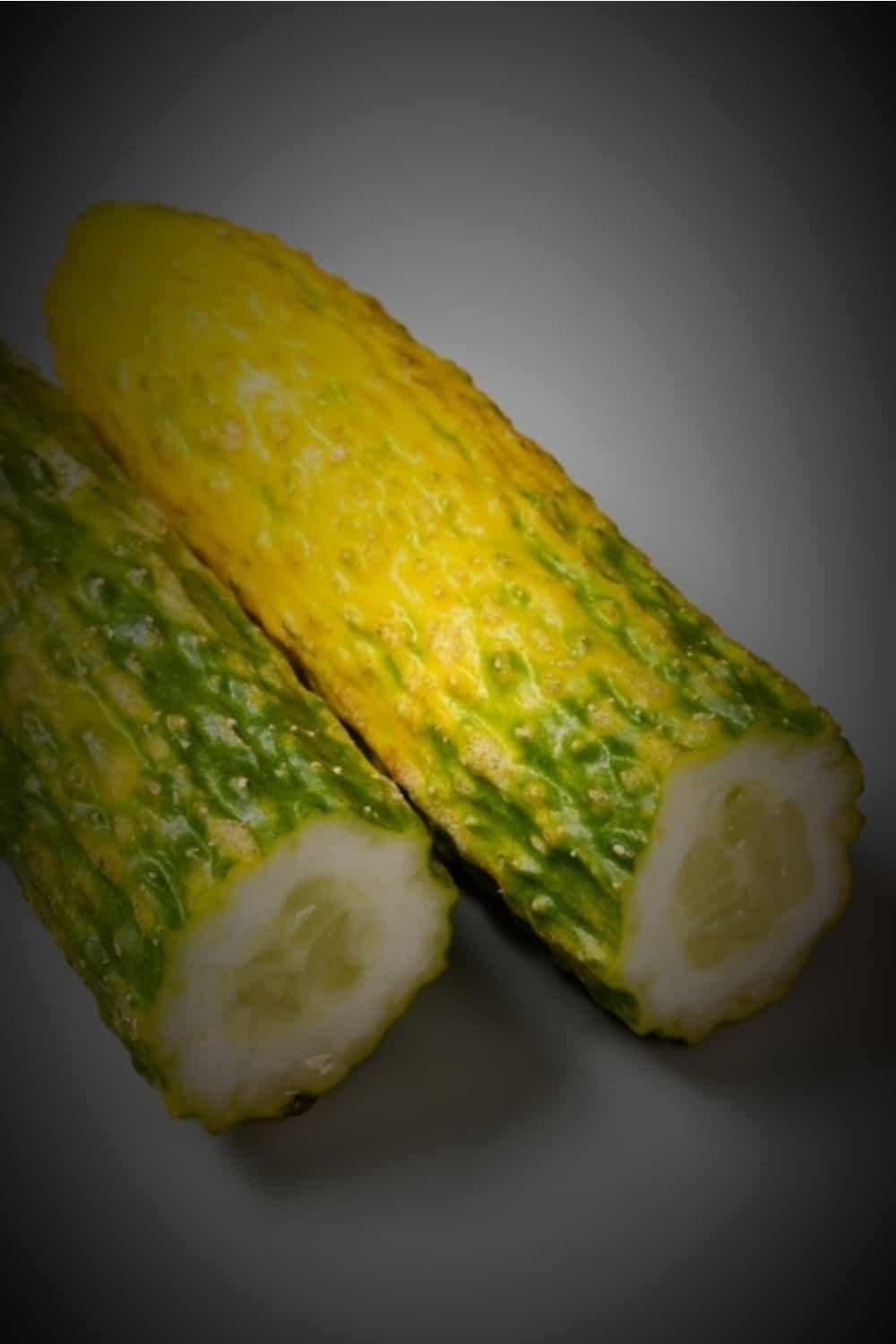
To round off this whole story about cucumbers, it is important to explain how to recognize bad cucumbers. There are some spoilage signs you need to be aware of.
• Discoloration: The first sign of bad cucumbers you can easily recognize is different colors or discoloration. So, if your cucumber has turned yellow or brown or has dark spots on the skin or flesh, it is definitely starting to go bad.
• Softness: If you squeeze your cucumber a bit and it feels soft or mushy under your fingers, it is most likely overripe and is at risk of starting to spoil.
• Bad Smell: Cucumbers typically have a mild, fresh, and slightly sweet aroma. However, once they start to spoil, they will most likely take on a sour, unpleasant aroma, and you should get rid of it in that case.
• Bad Taste: If you are still not sure of your cucumber’s freshness and quality, you can take a bite. If it has a mild, refreshing taste with a slight sweetness to it, you can freely continue to eat it.
However, if it tastes bitter or has a strange flavor, it may be spoiled or overripe and it is best to discard it to stay on the safe side.
• Wrinkles: Wrinkles alone won’t do any harm to you, but if a cucumber has any wrinkles or appears shriveled, it is likely past its prime and won’t taste as good as a fresh one.
Summary
So, do cucumbers need to be refrigerated?
• All in all, unlike some other fruits and veggies (like grapes for example), whole cucumbers do not necessarily need refrigeration because they will stay good for longer if properly stored at room temperature.
• However, once you slice your cucumber, it is best to store them in the fridge, but you have to know that they won’t last there for too long because they are also sensitive to low temperatures.
• Finally, refrigerated pickles have to be stored in the fridge, while fermented and canned pickles can freely be stored in a cool, dark place for quite a long period of time.
Sources:
1. https://snaped.fns.usda.gov/seasonal-produce-guide/cucumbers
2. https://rvpadmin.cce.cornell.edu/uploads/doc_500.pdf
